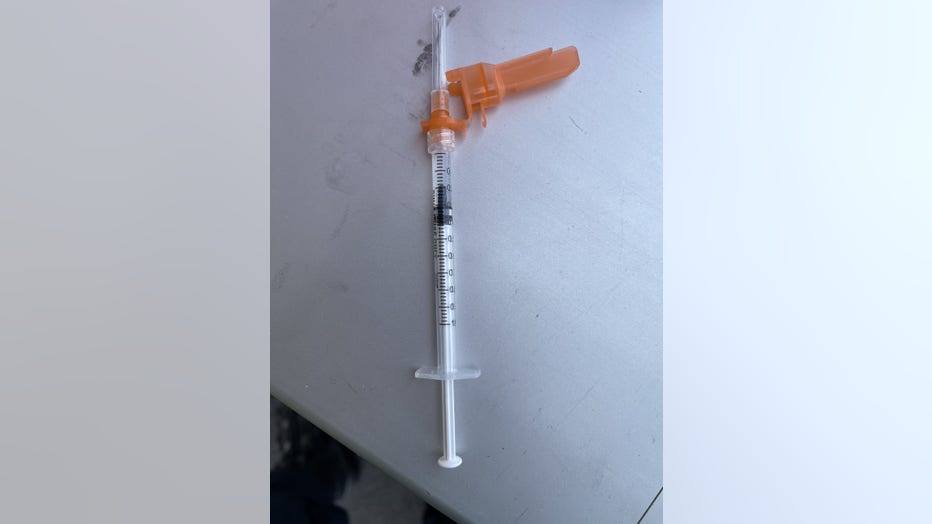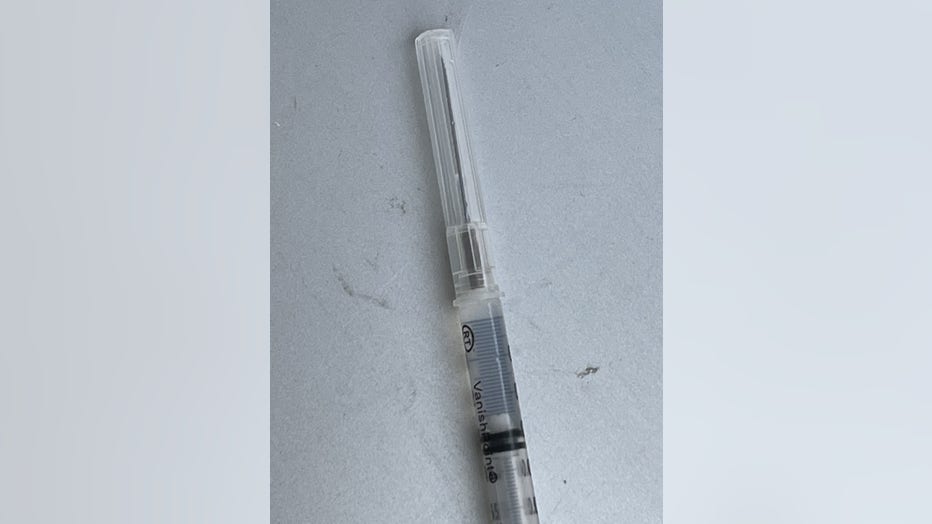Thousands at Oakland Coliseum received wrong vaccine dosage, medical staff say

Thousands received wrong dosage of Pfizer vaccine at Oakland Coliseum
KTVU's Cristina Rendon explains how the error happened, when it was determined, and why officials say you shouldn't be worried if you received one of these shots.
OAKLAND, Calif. - Thousands of people who visited the mass vaccination site at the Oakland Coliseum received the wrong vaccine dosages this week, raising questions about the effectiveness of the medication, according to two medical workers who contacted KTVU.
People who received too little of the Pfizer doses received their vaccines on Monday before 2 p.m. But at that point, the issue was identified and was stopped by that evening, according to the EMTs, who asked to remain anonymous in order to keep their jobs, and which was confirmed by state officials. That is the only day and time period in question.
One EMT estimated that 4,300 people had been given the shots by then. A total of 6,000 people can be vaccinated at that site during the weekdays.
State officials dispute the notion that anyone will be less protected by the smaller vaccine doses, although another infectious disease expert said there's not enough science to prove that yet. The claim comes at a time when people nationwide are clamoring to get vaccinated, and as shortages and confusion about making appointments and who is eligible, abound.
The problem at the Coliseum site stems from the orange-capped syringes that were used -- and the amount of Pfizer vaccine that they can deliver.
The optimal amount to receive is 0.3 mL of vaccine.
However, both EMTs said that the 0.3-mL syringes that they received from a national stockpile left about a third of vaccine stuck in the bottom of the plastic container; the syringes are designed in such a way so the plunger can't reach all the way down, leaving about 0.05 to 0.1 mL of wasted vaccine behind.
That means that many of the people who received shots before the problem was discovered on Monday could have received a smaller dosage amount of 0.2 mL.
Dr. Gerry Meta, medical director at the Coliseum site, took issue with how much vaccine was actually left stuck behind, saying that when he tried it, he saw that a smaller amount was left behind in the syringe. But he acknowledged that it all depended on how hard someone pushed down on the plunger.
Jorge Munoz, 44, the legal conservator for his brother, who has cerebral palsy, received a vaccine on Monday during the time period in question and said he was very concerned.
"The president didn't have these problems," Munoz said, referring to Donald Trump who tested positive for coronavirus and received excellent medical care. "But us regular people do."

Exclusive look at Oakland Coliseum’s mass vaccination site
FEMA and Cal OES directors say as supply of the COVID vaccine increases, the mass vaccination site at the Oakland Coliseum could open up to residents from outside Alameda County. KTVU's Tom Vacar reports the site is set to open Tuesday.
RELATED: Oakland Coliseum mass vaccination site is one of 100 Biden promised to open
John Jones III of Oakland had long been critical of any type of vaccination. And learning about what happened at the Coliseum just solidified his skepticism.
"Historically, there's been a number of abuses toward the Black community from the medical field, namely the 40-year long Tuskegee Study," Jones said, referring to an unethical study regarding African-American men and syphilis. "Anything that seems to be for our benefit seems to always have an adverse impact."
A similar syringe issue was reported across the country in January when "Operation Warp Speed" vaccination kits contained syringes that kept portions of the vaccine trapped inside.
Both medical workers who spoke to KTVU also claimed that managers and tent leaders at the Oakland site wanted to "sweep the problem under the rug" just to keep the vaccination numbers high.
The Coliseum site was specifically set up to help people in marginalized communities and to make sure that they were able to get vaccinated.

This is a 0.3 ml syringe that is supposed to be used to administer the Pfizer vaccine. Photo: courtesy of medical staffer at Oakland Coliseum
Authorities at the California Office of Emergency Services and the Federal Emergency Management Agency, both agencies that run the site, did not know about the problem until Tuesday when KTVU alerted them about the syringe capacity issue brought forward by the two whistleblowers. Cal OES spokesman Brian Ferguson said that because the whistleblowers brought the issue to light, high-level meetings were held Tuesday afternoon among their agencies, as well as the state Department of Public Health, U.S. Health and Human Services and Pfizer, to determine what to do.
In the end, Ferguson said that the stakeholders felt the amount was "negligible" and that there was no need to contact any of the patients who may have received smaller doses of vaccine at this point.
In an interview on Wednesday, Ferguson said: "We don't think anyone was formally underdosed."
Keep up with the news by downloading KTVU's news app and subscribing to our newsletter.
Ferguson added that after talking to doctors and Pfizer, authorities were told that the dosage fell into proper health guidelines and protocols. He said Pfizer told the agency there's no reason to be concerned unless if someone were to receive less than half of a single shot. If someone got less than 50%, then Pfizer said they should get another shot right away.
However, if things change and "should any inadequacies be identified, or follow-up be needed," Ferguson said that FEMA and Cal OES "will expeditiously make corrections." He said authorities have everyone's contact information through the sign-up portal.
Ferguson also refuted the claims that managers told healthcare workers to keep the problem hidden, saying that there were some pharmacists and medical directors who had met about the issue and alerted the proper authorities in a timely fashion.

These syringes have a spring load and deliver the proper amount of vaccine. Courtesy: Medical worker at Oakland Coliseum
Dr. Peter Chin-Hong, an infectious disease physician at UCSF, said people shouldn't panic.
He believes that people who got underdosed can make it up during the second round of shots, even if they aren't given more to compensate for the lesser amount. There are indications, he said, that even one dose of Pfizer's vaccine is pretty effective, but for now, the underdosed people should act as if they hadn't gotten vaccinated at all. After the second dose, he said, they should be fine.
And if people really want to be reassured, they can ask their doctor for an antibody test after the second dose just to make sure. "They're likely protected," he said.
However, Dr. John Swartzberg, clinical professor emeritus of infectious diseases and vaccinology at UC Berkeley Public Health, pointed out that there are no scientific studies conducted yet to determine how effective a vaccine at a lesser dosage is.
RELATED: Pfizer study suggests vaccine works against virus variant
And he said the burden of what to do should fall on Cal OES and FEMA to bring together scientific minds at the Food and Drug Administration and the Centers for Disease Control to figure out how to proceed.
But he agreed that it is not proper to give a bigger vaccine dosage the second time around, as the optimal amount is 0.3 milliliters and not more. He thought that perhaps people who received the lesser amount should probably get a booster shot in the next three months or so.
"What to do is a judgment call," Swartzberg said. "There is no science yet to guide us. It's very likely that these people have a decent immunity already and I wouldn't want them all to freak out. Now, they just have to figure out what's the best thing to do in a bad situation."
Even after these revelations have come to light, one of the EMTs who first reached out to KTVU said that the orange-capped syringes are still being used at the Coliseum site.
They are now just being filled with 0.4 mL of vaccine. That means that people are now getting properly dosed, but 0.1 mL of vaccine is being left behind at the bottom of the syringe, the EMT said.
He also said there is a different spring-loaded syringe being used at the site that delivers the proper amount, but that tool is more expensive, he said. He also provided pictures of both syringes to compare the designs.
Earlier this week, he said he was told not to use the spring-loaded syringes, but now, he and other medical staff are using a mix of the expensive and the orange-capped ones.
He said he's OK with that, as long as people are getting properly dosed, and that waste in government, to him, is just par for the course.
Lisa Fernandez is a reporter for KTVU. Email Lisa at lisa.fernandez@foxtv.com or call her at 510-874-0139. Or follow her on Twitter @ljfernandez

